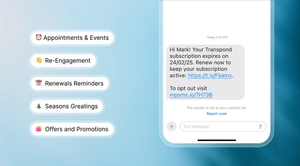Ask ten accountants how they manage their clients and you’ll get ten different answers. For one, it’s a colour-coded spreadsheet, for another, it’s a shared folder and an email search bar. A few might have actual client management software in place, but it often stops at the basics: names, addresses, and a list of due dates.
That patchwork can hold together for a while. But once things get busy and tax season hits, the cracks show. A client’s payroll data is buried in a thread no one can find. Someone updates a sheet, but forgets to tell the rest of the team. An urgent request sits unseen because the person handling it is on leave.
The problem isn’t effort – accounting firms work hard to keep things moving. It’s that the tools don’t always keep up. Modern client management software for accountants does more than store contact details. In this guide, we’ll look at what’s worth using and why the right one could make a noticeable difference to your practice.
Why accountants need client management software
In many firms, valuable time is lost between a client making a request and the team acting on it. Updates move slowly, responses get delayed, and small questions end up sitting unanswered. Over time, that lag erodes client trust and makes it harder to meet expectations.
Technology closes that gap, and the numbers speak for themselves:
- 97% of accountants say it saves substantial time in preparing and filing tax returns. Gains are also reported in cost accounting (94%) and bookkeeping (92%).
- Firms using leading platforms report up to 50% faster client response times and a 40% increase in engagement rates.
- During peak season, automating client communication has saved as much as 288 hours, reducing the time spent chasing documents and waiting for replies.
For accounting practices that want to work faster and keep clients engaged, the right tools make a measurable difference. Here’s what to consider.
Best accounting practice management software
Capsule CRM — your complete client management hub
It’s Monday morning, and your inbox already has VAT reminders, a payroll query, and a client asking for last year’s reports.
In most firms, that means three different searches and a lot of guesswork. With Capsule, every request sits on a single client timeline.
Emails, files, notes, and tasks are linked together, so the information you need is always in the same place.
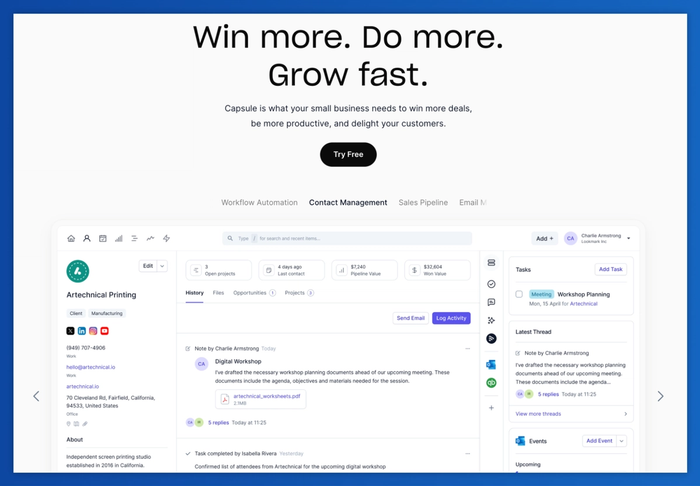
Capsule works as accounting practice management software from day one. Add VAT dates, service tiers, or partner names as custom fields, keeping client data easy to find when you need it. Use recurring tasks for scheduled work such as payroll runs or quarterly filings, and let automated reminders keep the right team member on track.
It also integrates with the tools that accounting professionals already rely on.
Xero, QuickBooks Online, FreshBooks, and FreeAgent sync financial records in the background. Gmail or Outlook can log messages directly to a client’s record. That means faster responses and fewer hours lost to manual updates.
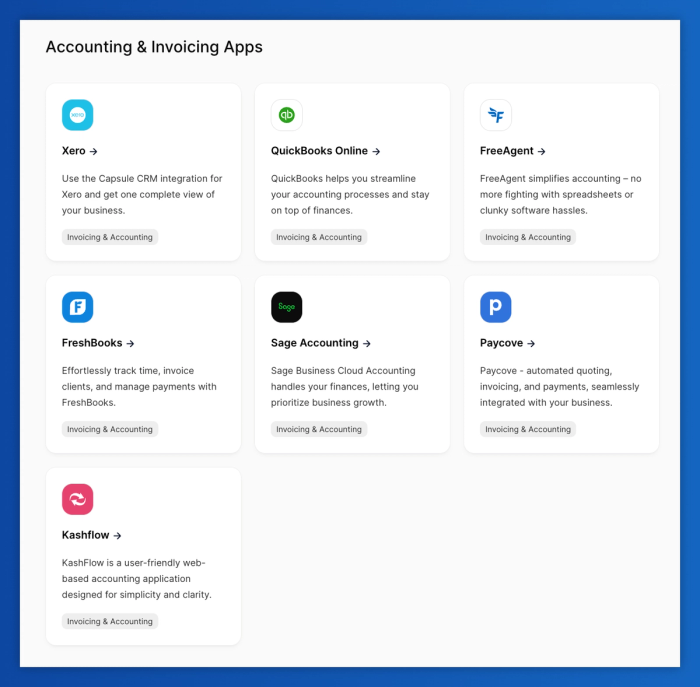
Workflow management is designed to fit how accountants work. Tracks let you standardize repeatable processes, such as onboarding a new client or handling annual accounts.
Tasks can be delegated across multiple team members, with Capsule tracking progress from first contact to final delivery.
Access controls keep sensitive client information locked down to the people who need it. Confidentiality stays intact, while your team can still work without roadblocks.
And with Capsule’s mobile app, client records and real-time updates travel with you — whether you’re on-site, in a client’s office, or between meetings.
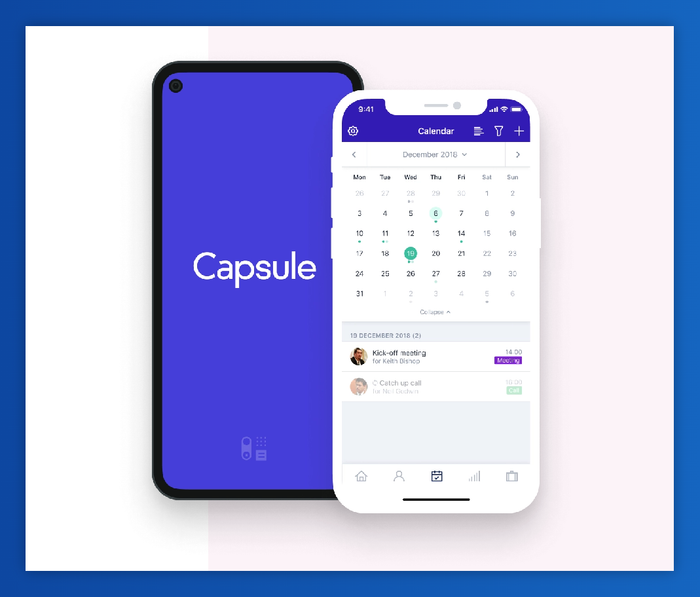
Accounting firms that switch to Capsule don’t go back. It brings order to client work and frees your team to focus on the work that grows the company.
Try Capsule with a free version or a 14-day trial to experience the difference firsthand.
[CTA]
Karbon
Karbon pitches itself as practice management software built for accounting teams that need more than a shared inbox and spreadsheet. It gives you one place to track client requests, assign and manage tasks, store working papers in cloud storage, and see where every job stands. The client portal lets you securely request documents and collect e-signatures without chasing attachments over email.
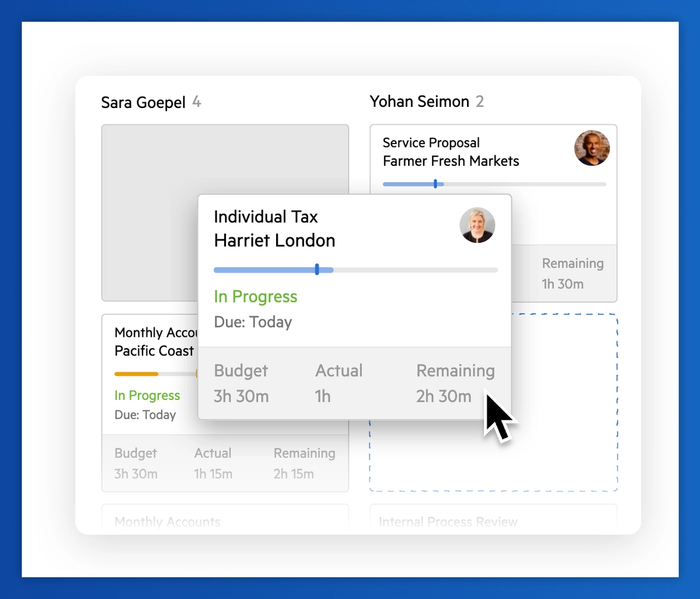
For partners and managers, reporting tools break down work in progress so you can uncover insights, keep client expectations in check, and monitor individual performance. Automated task lists make recurring jobs harder to miss, and time tracking means you know exactly where billable hours are going.
That said, reviewers on G2 have flagged some drawbacks.

Setup can take longer than expected, especially if your team is used to a lighter system. Ad-hoc meetings and quick to-dos can be clunky to log, and you’ll need a Microsoft Office license plus some extra setup if your email is hosted elsewhere. Customizing the client view is also limited, which can be a sticking point if your firm relies heavily on tailored communication.
Karbon isn’t cheap: $79 per user, per month. For smaller firms, the cost and learning curve might outweigh the benefits.
ClickUp
ClickUp is a project management platform first, and a client management tool second.
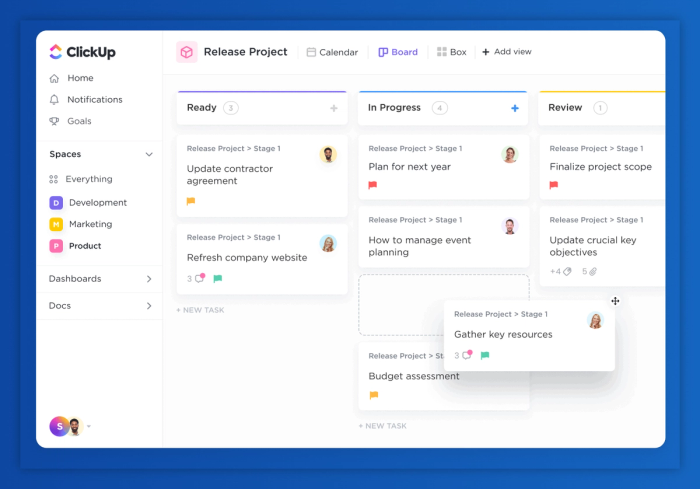
ClickUp can help accounting teams coordinate team collaboration and keep client interaction in one timeline and centralized space. You can delegate tasks and set up automated workflows for recurring jobs like reconciliations or quarterly reviews.
It’s free on the basic plan, which makes it tempting for smaller firms and solo accountants testing digital firm management tools. But ClickUp’s biggest strengths are also its weaknesses.
It tries to be the all-in-one solution for business processes, lead management, and workflow automation, which can make it feel bloated.
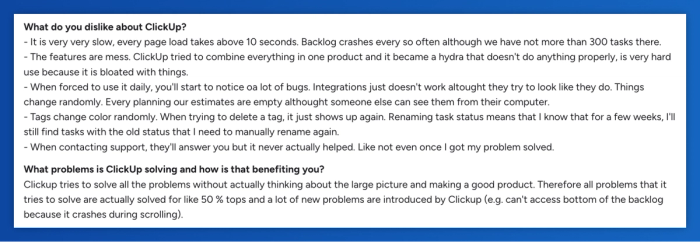
In one G2 review, an accounting user flagged slow loading times, frequent crashes, and unpredictable bugs like disappearing estimates and tags changing colour. Integrations sometimes don’t work as expected, and updating data can be frustrating when task statuses revert or require manual renaming. Support replies, but resolution isn’t always forthcoming.
ClickUp can help CPA firms and top accounting firms organise projects and save time on admin, but it’s not designed with sales pipelines or client nurturing in mind. For firms where client relationships and potential leads matter as much as the work itself, the lack of dedicated sales modules or billing features means you may need another tool alongside it.
Google Sheets (or Spreadsheets in general)
When accounting teams first move away from sticky notes and handwritten lists, Google Sheets often feels like a fair step up. It’s free, familiar, and instantly shareable with your team. From simple tracking of client requests to sorting billing data, it works well... at first.
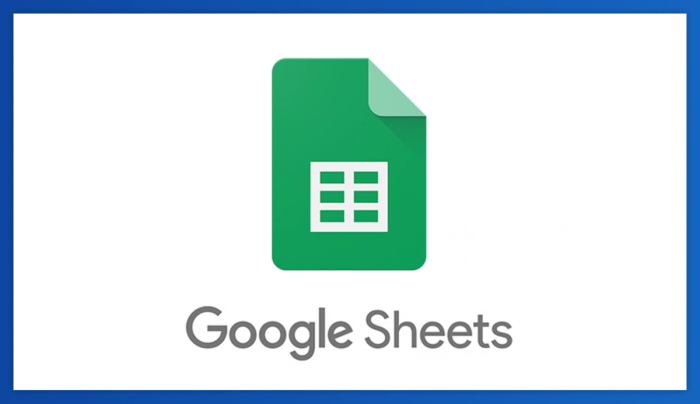
But spreadsheet 'solutions' start to show limits fast. You can’t automate reminders or standardize workflows without manual workarounds. Want to manage task management, see real-time notifications, or filter by VAT due dates? You’ll end up building the equivalent of a mini-CRM in sheets, with nested formulas, conditional formatting, copied cells, and a handful of hidden tabs.
It works until it breaks.
Spreadsheets also come with hidden scaling costs. Once your team is more than two or three people, version control breaks down. Client history fragments across tabs, team collaboration slows, and your data becomes harder to trust.
At the end of the day, Google Sheets can serve as a stopgap, and businesses might soon find themselves outgrowing it. That’s when a CRM like Capsule, designed to manage the full client lifecycle, becomes the obvious next step.
BrightManager
BrightManager is a practice management platform designed for accountants and bookkeepers, packing in everything from client onboarding and AML checks to document management, time tracking, and profitability reports.
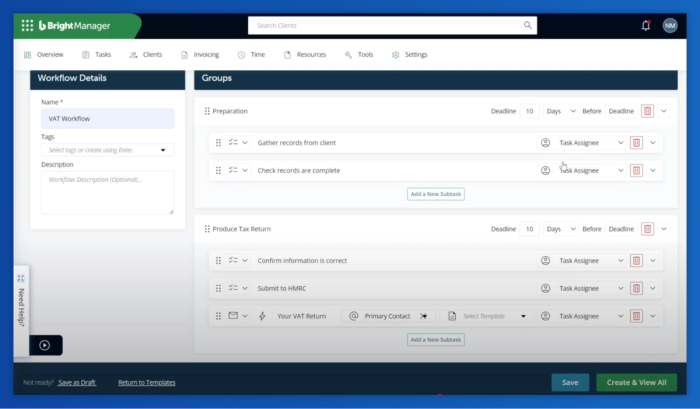
It’s built for teams who want to monitor firm profitability and keep the entire team aligned through client portals and deadline tracking.
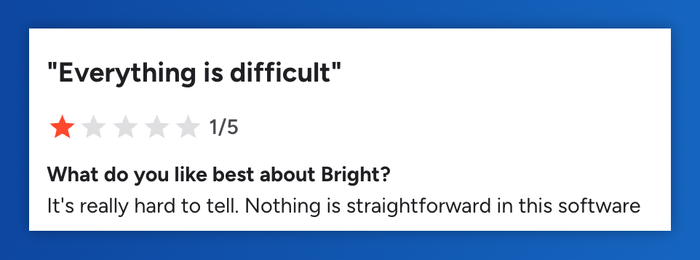
That said, it can feel complicated to navigate — not everyone finds it intuitive — and the breadth of features may be overkill if you just want a straightforward way to manage customer relationships.
It’s also on the pricier side: the Standard plan is £42 + VAT per user per month (up to 12 users, billed monthly), with add-ons like AML credits at £2.99 per 5 checks, a white-labelled client portal for £20.50/month, and SMS credits at £0.07 each. For a 12-person firm, that’s over £6,000 a year before add-ons, and the extras can quickly push that figure much higher.
For smaller accountancies or practices that don’t need deep compliance workflows, something leaner and more user-friendly – like Capsule – will likely be a better fit.
Notion
Notion has a strong following among startups and creative teams, but for many accounting firms, it feels like it was built with engineers in mind. The flexibility is undeniable. You can add notes, track projects, and store a curated library of resources all in one place – but that same flexibility often comes with complexity.
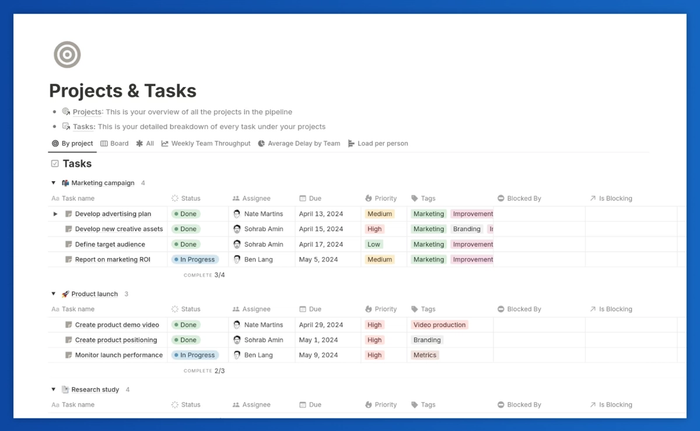
For firms focused on client relationships, the steep learning curve can be a roadblock. Reviewers note that basic actions, like duplicating a task or updating dependencies, can involve too many steps. This can lead to hesitation among staff who fear they’ll 'break' a process.

While Notion offers a free plan, most firms find themselves needing paid upgrades for advanced data collection, quick access to databases, and integrations with other modules. Those add-ons can add up quickly, especially compared to tools purpose-built for client management in accounting.
It can certainly work as a central hub – storing process documentation or organizing resources like checklists and email templates. But if your goal is seamless client management without a heavy setup burden, Notion’s strengths in customization may still fall short of delivering the plug-and-play ability that busy teams need.
Over to you
Many accounting tools promise to 'streamline' your work, but end up drowning you in complexity and costs. For smaller accountancies, that can mean paying enterprise prices for features you’ll never use… while still struggling to keep client data, tasks, and communication in one place.
If you’re tired of overpriced add-ons and tools that feel like more work than they save, Capsule is your way out. Start your free trial and see how much easier client management can be.
FAQ
How can accounting firms improve client communication?
If an accounting firm wants to improve client communication, the fastest win is to reduce the number of disconnected channels. This is usually the biggest challenge because fragmented tools make it hard to follow a conversation from start to finish. When updates, questions, and approvals live in one connected system, there’s less chasing for answers and fewer missed deadlines.
What firm management features matter most to accounting professionals?
While preferences vary, accounting professionals often get the most value from tools that actively prevent missed deadlines and scope creep. This means automated task assignment, linked workflows between tax, payroll, and bookkeeping, and profitability tracking to flag unprofitable clients early. Features that surface this data in real time give managers the ability to adjust workloads before issues snowball.
Are client portals essential for CPA firms?
Usually, a client portal is 'nice to have' once a CPA firm is juggling recurring work for dozens of clients. However, a client portal isn’t the only way to do it — a well-structured CRM can centralize conversations, tasks, and client history in one place. The key is to ensure every interaction, from quick updates to document requests, is logged and accessible so your team has full context before picking up the phone or replying to an email.
How can accounting firms balance efficient document management with maintaining strong client relationships?
It depends on how integrated your systems are. For example, pairing automated document collection with a workflow tool that alerts you when a client has submitted or missed something lets your team follow up with a personal note instead of a cold system message. That way, you keep processes efficient without making interactions feel transactional.




